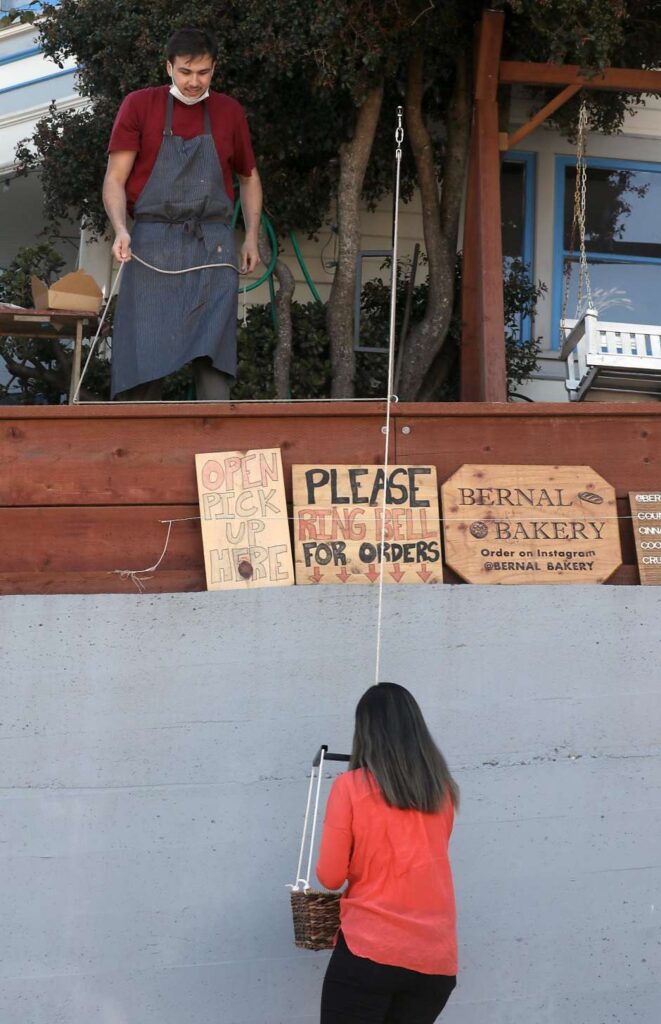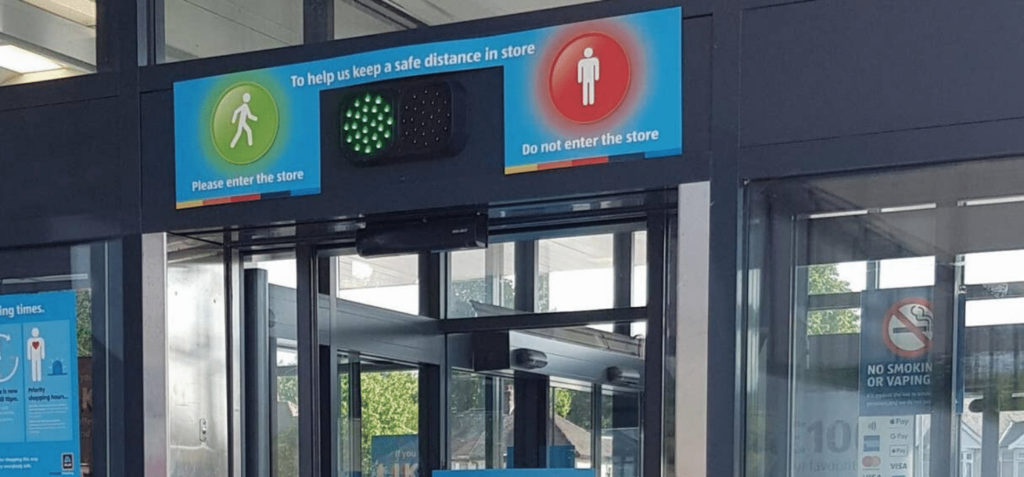In order to make people feel comfortable and safe, U.S. companies are turning to a variety of strategies to incorporate and enforce social distancing. Retailers are working in creative and new ways to limit occupancy and face-to-face contact through devices ranging from vintage pulleys to talking robots. Financial institutions are requiring appointments, adding video screens to drive thrus and self-service machines, and offering curbside service. Telecom providers are using apps to assist with the entire customer journey, from online ordering, to arrival at the store, to employee interactions, and to contactless payment kiosks.
Table of Contents
Retailers
- Bernal Bakery: This pop up bakery in San Francisco, California uses a basket attached to a vintage pulley to delivery orders to customers. The business allows customers to place orders online, and ring a wireless doorbell when they arrive at the location to pick up their order. When the order is ready, it is lowered down to customers in the basket for contactless service.

- Darling Boutique: This award-winning boutique in Charlottesville, Virginia, is offering individual virtual shopping appointments via video call. This allows customers to browse, see, and interact with the unique consignment items virtually, and then pick up what they decide to purchase curbside. The boutique is also offering customers the ability to buy items posted on social media by sending a direct message, email, or phone call.
- Neighborhood Comics: This comic book store in Savannah, Georgia is scheduling private individual appointments for customers to come in and browse their comic book selection. This gives customers peace of mind to come and look at items in person, and also is helping the owner manage employee staffing and shifts. According to the owner Lee Heidel, “You really do judge a book by its cover, especially with a comic book, so being able to be there in person and see the merchandise, you can see pictures on the website all day long, but it’s very different when you’re interacting with these items one-on-one.”
- Fairway Markets: This retailer in New York is using a skip-checkout app that allows customers to avoid the traditional checkout process. While shopping, customers scan product barcodes, and then scan a special QR code when they are done shopping and pay on the app.
- Aldi: Aldi has launched an automatic traffic light system at the store’s entrance. The light turns green when the next customer may enter to limit the amount of shoppers in the store. The system automatically tracks the number of people in the store, and determines safe capacity based on the store size and layout. While this idea is currently in use Aldi’s UK and Switzerland stores, Aldi also operates in the U.S. and could easily incorporate this idea in the U.S. as well.

- Edeka: The German supermarket chain Edeka is using a robot called Pepper to assist with safe shopping behavior and regulate the checkout process. The robot also checks for masks at the store entrance and helps enforce social distancing. Customers can interact with Pepper instead of store employees to increase safety and allow employees to focus on other critical tasks.

- Botucatu Mall: This shopping mall in Sao Paulo, Brazil, allowed cars to drive into the mall. People are able to order online and pick up their purchases inside the mall without having to leave their vehicles.
Financial Institutions
- In-person appointments: A number of banks are offering in-person services inside the bank by appointments only. These include 1st Summit bank, ACCESSbank, and Cumberland Valley National Bank. Requiring appointments appears to be an important aspect of in-person banking activity moving forward, so that people may continue to receive valuable advice and personal interaction while staying safe and limiting the number of customers in the branch.
- Additional drive-thru services: Many banks are increasing the services they offer via their drive-thrus, including American National Bank and Trust Company, Berkshire Bank, and Citizens Bank. Prior to COVID, drive-thru lanes were primarily unmanned; the pandemic has reversed this trend, and live tellers for drive-thrus will likely continue as an important customer safety aspect for branches.
- Construction masks as face shields: The Bank of Hawaii is providing construction masks for their employees to use, so that they do not take face masks from the medical community, showing their commitment to the health and safety of their community as a whole.
- Curbside service: While curbside service is common amongst retailers, it is an unusual service for banks. By calling the branch in advance, Community Spirit Bank will offer curbside service to customers who cannot use the drive thrus or ATMs at the branch.
- Qudini technology: Several major global banks (RBS, NatWest, Standard Chartered, and Ulster Bank) are using Qudini’s technology to help ensure social distancing and provide safe and engaging customer interactions. The platform provides virtual queuing and visit scheduling, as well as virtual appointments. Customers can check in to the branch on an app and be notified when their turn in line is coming up. Customers can also schedule specific appointments, get SMS reminders, and cancel or change appointments seamlessly with Qudini’s integration. For customers who do not want to visit the actual location, they can view and schedule available one-on-one banker video service sessions for that branch.
- Video teller machines: As a bridge between face-to-face and fully automated banking solutions, some banks, such as Bank of America, are adding video teller features to their ATMs or other self-service machines. This allows customers to receive live advice and authorizations for services they are not usually able to do on these machines. It allows for safe personalized interactions at the actual branches or in more remote locations where the self-service machines are located.
- Limiting paper documents: There has been an overall increased acceptance of eSignatures and eDocuments though chatbots during the pandemic. Incorporating eSignatures to branches for in-person transactions would help decrease safety risks related to handling paper documents.
Telecommunications Companies
- Verizon: For customer safety, Verizon has implemented an online appointment system. Using the MyVerizon app, when the customer gets to within 75 feet of the store, they receive information about checking in and their wait time until they can enter the store. Verizon stores also have more digital bill-payment kiosks for contactless payment options. Additionally, employees can connect their tablets with customers’ devices via a co-browsing system to assist them without touching the devices. Finally, customers order online and pick up in store by scanning a QR code on their phone. This Touchless Retail model is designed to make the customer experience safer and more satisfying.
- Amdocs & Globe Telcom: The Globe Telecom provider is using a multi-queue management and appointment scheduling system, designed by Amdocs (U.S. based) and implemented by Q-nomy (U.S. based), to adhere to social distancing regulations and enhance the customer experience in their stores in the Philippines. The system “includes an effective multi-channel in-store queue management, appointment scheduling and customer flow orchestration platform, helps keep customer wait time in-store to a minimum by providing continuous notifications, with scheduling and routing based on customer needs and customer care executive skills. The customer experience will be further improved by the deployment of interactive kiosks and digital signage within stores.” According to Bernie Llamzon, Executive Vice President and Head of Channel Management at Globe Telecom, “The queue management system will not only ensure effective social distancing but also provide a more personalized and enhanced ‘digital like’ in-store experience.” Chief marketing officer at Amdocs, Gary Miles, adds, “In a digital-first world, it is crucial for businesses to adapt to customers’ evolving preferences and needs. This means offering them a seamless transition and experience when switching from digital channels to physical stores via a ‘one-tap’ response to queries — without making consumers wait either in the digital or physical world.”
- Orange France: This telecom provider’s app or website allows customers to reserve an appointment time at a location near them.
- EE: This UK company also launched a virtual queuing system through which customers can use their app to book in-store appointments, and then receive a text when their advisor is ready to speak with them.
- SK Telecom Co: This South Korean wireless provider is opening a new store concept in partnership with Apple, Microsoft, and Samsung. The flagship store, called T Factory, will “feature an unmanned zone in line with social distancing efforts amid the pandemic, where users can purchase or sell phones through digital kiosks, and receive pay plan recommendations via artificial intelligence.”


